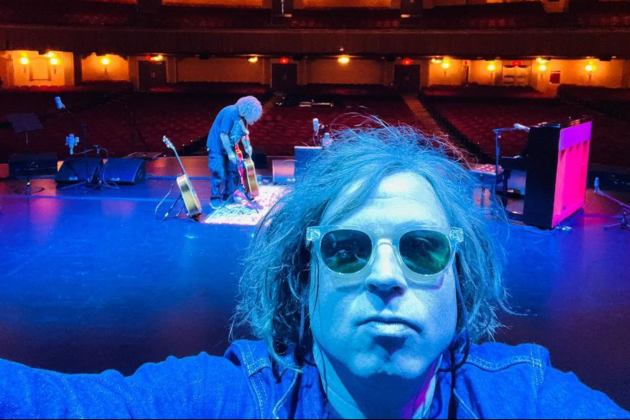
When Ryan Adams took to the stage of Carnegie Hall in May for a sold-out show, his first public one in nearly four years, he received a standing ovation when he walked onto the stage that, by some accounts, lasted several minutes. The actual length of the ovation (and several that are said to have followed over the next three hours) is undocumented because, apparently, there were no journalists on hand. That absence seems to have been a mutual decision: The press was not invited to cover his comeback, and journalists are wary, or weary, enough of covering Adams that it would seem none bought a ticket to do so. Nonetheless, somewhat under the radar, the seeds of some kind of return to the public realm were sewn.
Adams had a pretty good week after that, too, especially relative to how the last three years have been going for him, since a 2019 expose of the singer-songwriter’s allegedly manipulative or harassing dealings with women in his orbit made him one of the foremost emblems of #MeToo in the music world. From May 14-21, he did five east coast shows in all, with a total gross that his reps put at around $600,000. These include the Carnegie gig, which sold 2,741 tickets with a $150,205 gross, and a second NYC show at the Beacon, where 2,261 tickets were sold and $188,424. Not bad for concerts with pretty low overhead; they all consisted of Adams alone on stage for two hours and 40 minutes a night.
More from Variety
So… is Adams’ “cancellation” slowly getting un-canceled, while the media and his many detractors aren’t looking? And what’s the cap on a comeback when so much of the public tide outside the core fanbase has seemed irreversible?
These are questions that are certainly way too loaded for five successful shows to answer. But the new team that is backing Adams — including manager Richard Jones, crisis-PR specialist Howard Bragman and ICM agent Mike Hayes — believes this is just a start for Adams getting his career out of the amber it was seemingly frozen in in 2019. Although there is only one additional date that’s been put on the books so far, a fall show at L.A.’s Orpheum (for which a seating chart indicates about three-quarters of the seats have sold through), more U.S. dates through the end of 2022 are likely to be put on sale in the coming weeks, with overseas bookings being looked at for 2023.
“We were not seeking any press, as we were able to sell almost all the concerts out without any publicity support,” says Bragman. “We are willing to do this one story about his new representation, because number one, we think we’re going to get a fair shake. And number two, we want to show that he has a real team behind him that believes in him and supports him, and that he’s putting a life together. We want people to notice, and if they want to move forward with him, here’s where we are.”
Jones, who came on board as manager after the shows were booked but before they were performed, says he understands there was a reluctance on some people’s part to book Adams before the Carnegie date was announced.
“There were people straight away that wanted to do the shows, so the idea was originally only to do one show, and then obviously the demand was so great that it grew,” says Jones, whose Key Music Management works with clients like the Pixies, Gang of Four and Dead Can Dance. “What’s happened, noticeably, since we’ve completed those shows is the amount of promoters across the world that have now contacted us and are offering dates in venues and wanting to book Ryan. I think the truth is, somebody had to do it first, and then people noticed and realized that it was successful, and he was obviously in an extremely good place personally and could deliver such a good, extensive show. His performing 168 songs over the five nights is pretty remarkable by anybody’s standards. And the numerous standing ovations — the first one I think it was four or five minutes, when he walked on stage at Carnegie Hall — I know Ryan was very moved by it and somewhat humbled by it. He’d worked very hard to prepare for these shows and give his fans a night to remember.”
A few full houses at theaters in the Northeast might not be major news for most artists who’d had top 10 albums in the U.S. and U.K. as recently as 2017, but for an artist who’d been seen in the business as — and had even portrayed himself as — an untouchable, that one-week 600K gross registered as quietly seismic.
But it’s not as if anyone is about to forget an elephant in the room that looms far larger than the size of Carnegie’s Stern Auditorium. Adams became a performer non grata after a New York Times piece included interviews with seven women who said they’d been subject to sexual misconduct and/or emotional abuse by Adams (including ex-wife Mandy Moore and famous former proteges like Phoebe Bridgers, as well as lesser-known artists and unnamed women). The worst charge, that he had exchanged thousands of explicit texts, photos and videos with a minor, became the subject of an FBI investigation, though the New York Post eventually revealed that it had been dropped in late 2019, with the girl swearing that she had lied about her age to Adams. (Adams’ defenders are still mad the Times never followed up on its story about the FBI investigation to report about it being put to rest.)
But even with the possible legal trouble gone, the moral stain was not so quickly wiped away, with many more coming out of the woodwork to further attest to his alleged manipulation of female artists throughout his career or just a history of burned bridges with all genders. By July 2021, Adams was on Instagram telling fans that all his business relationships had been severed and that he was down to “no friends” except for “my best friends from when I was a kid.”
That turned out not to be quite true. A high-profile pal from his adult life, super-producer Don Was, has stuck with him, for one. Adams’ Instagram feed from his east coast shows revealed that Was was professionally recording all of them, even the soundchecks, and that a Carnegie Hall box set will likely be forthcoming, to supplement the previous Carnegie Hall box set he released in the mid-2010s. But it apparently still won’t be on the label Was is president of, Blue Note. Capitol Music Group dropped Adams’ indie label, Pax Am, from a distribution deal after the scandal, and that’s not likely coming back.
Being forced to be an independent artist now, as opposed to have willingly taken up the mantle before, does not stand in the way of Adams being famously the most prolific recording artist in rock. Already this year, he has released two double-albums, the 18-track “Chris” in April followed by the 19-track “Romeo & Juliet” in May. (Both are digital-only for now, despite fan protests, as Adams has written he has not found a CD or vinyl manufacturer he’s happy with at present.) These are his 19th and 20th studio albums, by most counts. A Google search turns up no major media outlets that reviewed either album — only bloggers, just as with the May concerts — but his unusually constant communication with his most fervent fans on Instagram may make up for a Pitchfork’s disinterest in getting the word out.
Both Bragman and Jones say they did due diligence before taking on Adams as a cause as well as a client.
“I’ve been involved in the #MeToo movement – (associated with) people who’ve been accused, people who are accusers, people thrown into it tangentially — for a very long time,” says Bragman. “And I don’t think every alleged victim should automatically be believed, but I do think every alleged victim should automatically be listened to. There was a lot of listening done. And I think in the end I made the decision that was the right decision for me. One doesn’t go into crisis PR without a great deal of empathy, and knowing that part of the human condition is we’re imperfect. But, you know, I have really enjoyed working with Ryan. I think he’s a really good man. And I think he’s a really excellent man when he’s sober, and that’s made a big difference. I’m not interested in representing him if he’s not sober.”
Adams recently posted that he was hitting his nine-months-sober mark. This is not the first such time he’s made that kind of claim: In 2020, when he issued a public but unspecific apology addressed to anyone he’d hurt in the wake of the previous year’s stories, he said he was newly sober then, too. Adams fans don’t get a clearcut sense of when he’s sober or when he’s not: Even when he was apparently drinking, he appeared highly functional, keeping up his steady stream of songwriting and sometimes daily web concerts during the pandemic, and posting photos from his five-mile walks and runs around the Hollywood reservoir.
One thing that’s clear is that Adams might face a no-win situation, in either going back to address the situation that landed him here or just moving on. Many of those who’ve followed the situation, maybe even most, found his 2020 apology insufficient, in that Adams didn’t actually cite anything he’d done wrong, after having denied the 2019 Times allegations at the time. Nor did he address anything too specific in the one lengthy profile he’s sat for since then, a sympathetic 2021 Los Angeles magazine article that many of his fans found cathartic, and which just further angered those who don’t believe he’s done any real atoning.
Bragman says not to expect Adams to talk too much about the past allegations. “I don’t think he’s ever going to address it, and I don’t think he needs to address it,” says the publicist. “But when you say ‘put these things in the past’… it’s been way out there. It’s on his Wiki, and [when he dies], hopefully in 75 years, that’ll be in his obit, probably. That’s just the reality of the world we’re in. But having gone to these concerts, the people who care about him care about his music. We’re into letting people make their own decisions without any added pressure from us. If they’re there, that’s great, and we’re appreciative. if they’re not, we wish you well, and we’re sure you’ve made the right choice for you for the right reason. We’re not going to second-guess you. It’s not going to help you. It’s not going to help us.
“I think cancel culture’s a pox on growth — on the human condition,” continues Bragman. “Cancel culture freezes bad behavior. It doesn’t give people a chance to apologize. Everything we like about our legal system is the presumption of innocence, the right to confront your accuser, the statute of limitations; none of that kind of stuff exists in cancel culture. And it’s really an uninformed way to respond to the world. I’m glad the tide seems to be turning. And I’m not saying there’s not bad people out there who don’t deserve not to be in the industry. There’s some bad guys out there. He just doesn’t happen to be one of them.”
Says Jones, “Personally, I see ‘call-out culture’ as better, far better than cancel culture. I understand that you can call attention to someone’s wrongdoing, and then, with the right people, they can have a chance to learn and correct the issue and become a better person. You can’t turn the clock back. We can’t change what’s happened. But I feel that everybody deserves a second chance, and as long as they follow the right path, then they should be allowed to certainly pursue that. Having said that, of course, should make their own economic decisions personally and wisely, and not as part of any social media movement. They should support artists they want to support, and don’t support the ones that they’re not comfortable supporting. We’re not banging a drum. People have to make their own minds up. We have to be very mature and contemplate what’s happened and work in the confines of that.”
Jones also believes sobriety has changed or will change Adams. “I’ve had other artists that have gone through sobriety and it’s the same thing. And I always find them far more realistic, actually, and kind of generally much more together as a person, because they’ve spent a lot of meaningful time thinking about themselves and what they need to do and how to improve themselves.”
As manager and publicity consultant, Jones and Bragman have stepped into shoes that others have been quick to step out of in recent years. Adams had a manager quit on him some months after the Times story broke; a leaked text exchange posted later by one of the Times’ reporters showed Adams writing, “I want my career back… I’m not interested in this healing crap. I want a plan and I want to work,” which was immediately followed by the manager looking to resign. Meanwhile, according to the Los Angeles magazine profile, Adams’ last publicist resigned the same day Variety posted a story last summer recapping the Instagram posts saying he was untouchable in the business, “scared” and nearing destitution.
Looking at the comments sections in any of Adams’ public posts, it’d be hard to imagine a more devoted base, whatever size it may be, with fans noting that they are happy they flew in from other countries to see the east coast shows, and an ongoing lovefest every time the singer ends a seemingly personally revealing post with the sign-off: “I love you cats.”
Some of those who have been part of Adams’ life and career in the past and are happy to keep that bridge burned are not eager to read stories about his redemption or any comeback, of course.
“I just wish people would stop writing about him,” sighs one person who was among the many sources for the New York Times story — frustrated with the feeling that interest in Adams is actually never-ending, despite the recent media disinterest in his new shows, and that debates over his supposed cancellation feed into Adams being guaranteed lifelong attention.
Since he participated in the Los Angeles magazine profile last year, Adams has avoided directly referring to the events that seemingly brought him down. But he may have said a lot just in a response he offered to Johnny Depp’s victory-lap post on Instagram, following a court verdict that went mostly in his favor. Adams added a comment under Depp’s post that consisted of a congratulatory heart and fire symbol.
Best of Variety
Sign up for Variety’s Newsletter. For the latest news, follow us on Facebook, Twitter, and Instagram.




